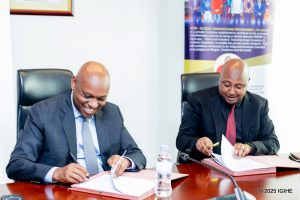The money will be distributed starting in February by the Business Development Fund (BDF) to Umurenge Saving and Credit Co-operative Societies (SACCOs), which are closely connected to small businesses, especially in rural areas.
Vincent Munyeshyaka, the CEO of BDF, told The New Times that the microbusiness facility will benefit 6,000 small business projects over the next five years.
“We are going to start distributing the money through SACCOs. The money is part of the recovery facility, and we will not exceed Rwf5 million for a small business owner,” he explained.
He said that small businesses benefiting from the facility will repay the micro-credit they receive at an 8% interest rate.
“We are going to start by distributing Rwf5 billion from January to June. This first phase will reach 1,000 businesses, and we will distribute the rest in July. The beneficiaries can come from all economic sectors,” he noted.
The scheme is part of a recovery fund aimed at continuing economic recovery and resilience in Rwanda by addressing the financing constraints of private-sector businesses post-COVID-19 pandemic.
The project is implemented by providing lines of credit targeting affected businesses to facilitate the refinancing of existing debt obligations, provide working capital, and support investments for business adaptation and growth through longer-term financing options.
The micro-business credit line facility aims to provide financial support to micro-businesses through lines of credit lent by BDF via microfinance institutions, mainly SACCOs, to final business enterprises.
The microbusiness credit line aims to support at least 1,300 enterprises with the original financing of the project and extend the facility to 6,200 microbusinesses through additional financing during the project period. At least 35% of the beneficiaries will be women-inclusive firms, with a non-performing loan (NPL) rate of no more than 5%.
Supporting Economic growth
SACCO managers said there is high demand for such financing, especially given its low interest rate.
“There was similar funding before, but we recorded such a high demand that only 5% of those who requested the money received it,” said Dorothee Mukarutamu, a manager of Nyabinoni SACCO in Muhanga District.
According to BDF, the government is considering keeping the Rwf30 billion in micro-financial institutions so that small businesses can access micro-credit in the long term.
Meanwhile, there is also a Partial Credit Guarantee Fund with Rwf30 billion in financing.
Pathway to SMEs growth
According to Michael Shyaka Nyarwaya, the CEO of Afri-Global Cooperation Programme Ltd, such financing for micro-enterprises will help the country reach upper-middle-income status by 2035, as Rwanda’s GDP per capita must exceed $4,000.
“The country aims to create thousands of jobs every year, and it is by supporting such micro-enterprises that they will be able to contribute to creating sustainable jobs,” he noted.
Rwanda seeks to create 250,000 new jobs annually over the next five years under the government’s Second National Strategy for Transformation (NST2).
He added that small businesses and SME leaders should be supported to connect with institutions that provide finance as a platform to leverage existing financing opportunities.
“One example is the young CEOs and professionals’ business meet-up, which also raises awareness and fosters understanding of the importance of financial literacy. Startups and small business owners can meet investors, including angel investors and venture capitalists, to amplify the private sector footprint. This can help discover opportunities as we explore more business ideas,” he noted.
According to Pierre-Célestin Rwabukumba, CEO of the Rwanda Stock Exchange, more financing for SMEs will also contribute to the growth of the capital market as the culture of saving increases.
He said capital markets will be able to serve SMEs, providing them with access to long-term funding.
Rwabukumba emphasised the need to change the narrative that the stock market only serves a certain cluster of large companies, noting that this shift sets the tone for creating more awareness.
According to the Ministry of Trade and Industry, MSMEs in Rwanda account for 98% of all businesses, employing over 2.5 million people and contributing around 33% to the country’s Gross Domestic Product (GDP).






